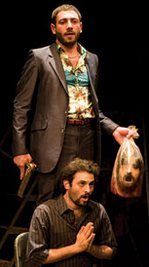HOME PAGE
SITE GUIDE
SEARCH
ADVERTISING AT CURTAINUP
REVIEWS
FEATURES
NEWS
Etcetera and
Short Term Listings
LISTINGS
Broadway
Off-Broadway
NYC Restaurants
BOOKS and CDs
OTHER PLACES
Berkshires
London
California
New Jersey
Philadelphia
Elsewhere
QUOTES
TKTS
PLAYWRIGHTS' ALBUMS
LETTERS TO EDITOR
FILM
LINKS
MISCELLANEOUS
Free Updates
Masthead
Writing for Us
A CurtainUp Los Angeles Review
Bengal Tiger at the Baghdad Zoo
| There are rules for you. For me, there are no rules. — Iraqui translator Musa to U.S. Marine Tom.
|

(top)Kevin Tighe (bottom) Glenn Davis
|
Lots of folks die in Rajiv Joseph's new play, many in stomach churning ways. But, as previously noted, death can turn a dangerously chuckle-headed Marine into a peaceful seeker of wisdom, and one who is fluid in Iraqi no less. Or it can make a grumpy displaced tiger keenly aware of his inner self, maybe even enough to swear off his beastly nature, if such a thing is possible. Joseph suggests it isn't. Human beings and big cats alike seem programmed to act in a certain way. The stress of war only makes things uglier.
There is much to chew on within Joseph's play in its world premiere production directed by Moises Kaufman (The Laramie Project & 33 Variations) at the Kirk Douglas Theatre. Bengal Tiger is a play about Iraq, certainly, but also about betrayal, guilt, the awfulness of being a stranger in a strange land and the difficulties of translation. Joseph, who has already won an NEA Outstanding New American Play distinction and an Edgerton Foundation New American Plays Award, may also have set a benchmark for the frequency of an expletive rhyming with "truck" in the space of two hours. But war is hell and the afterlife's no bed of roses neither. So eat your $%#@! heart out, David Mamet!
The salty language is actually an easy adjustment. What's unfortunate is that the playwright feels compelled to have his (mostly deceased) characters spell things out with such a heavy thematic hand. Small wonder, then, that the actor playing a living character &mdashArian Moayed as a gardener-turned-translator named Musa, ends up being Bengal Tiger's beating heart and conscience.
The play opens in 2003 with a pair of U.S. Marines blowing hot air while doing Green Duty at the, er, liberated Baghdad Zoo. Those animals which haven't been killed have fled. Not the tiger (played completely human by Kevin Tighe) who paces grumpily across his cage and waxes philosophical.
The more seasoned soldier Tom (Glenn Davis) has recently returned from a raid that dispatched Saddam Hussein's two sons, and has looted a gold plated gun and a gold toilet seat for his pains. Kev (Brad Fleischer), a new recruit, desperately wants to see some action. When the tiger mauls Tom, Kev shoots it with that golden gun. The act has reverberations. The firearm ends up in the hands of Musa, a translator dismissively called Habib by the Marines. Musa knows that weapon, and its owner, as he was personally enlisted to design the fanciful animal topiary in Uday Hussein's palace garden. It was an assignment, we later learn, for which Musa ended up paying dearly. Now, when Musa gets his hand on the gun he nearly goes into shock.
Uday (Hrach Titizian) is haunting Musa, albeit more with sneers, goads and vulgarities than with anything approaching wisdom. The Tiger haunts Kev, and after a brief return stateside, a disfigured Tom returns to Baghdad in search of his ill-gotten gold. In total, you've got some five or six men, women, tigers or ghosts roaming the shell- shocked city and its surrounding deserts, in search of some kind of meaning. Heck, in search of God if they can find him.
Displacement seems to be the common denominator. Kev and Tom should be home. Musa is home but can no longer recognize it as such. A leper woman (Necar Zadegan) is largely alone out in a desert colony, and the Tiger doesn't really know where he is.
Kaufman and Joseph intersperse the surreal with plenty of shock value and even some dark humor. The Marines, the Iraqi and that ghostly Tiger wend their way through a land of bombed out arches, once grand hotel lobbies and the remains of Uday's palace overlooked by Musa's topiary. Set designer Derek McLane and lighting designer David Lander (both of whom worked on Kaufman's 33 Variations on Broadway) give the scenery a nicely realized sense of other worldliness. Stretches of dialog are in Iraqi. Makes no difference; we know what's going on.
In Davis and Fleischer's Marines, the production has a pair of characters who are occasionally despicable and consistently believable. Fleischer's transition from callow, shoot-em-up loving grunt to enlightened soul is, if not credible, dramatically interesting. We certainly buy his going insane. Davis's Tom, meanwhile, learns precious little from his close encounter with the big cat. When he returns to Iraq, seeking to negotiate a sexual transaction with a teen aged Iraqi prostitute (Sheila Vand), Bengal Tiger reaches its absurdist apex. Moayed's Musa, who has to translate, somehow keeps his cool, but the encounter is driving him mad, too.
How much punch a play like this might have packed two or three years post "liberation" instead of six is anybody's guess. Joseph was inspired by the from-the-headlines tale of U.S. soldiers destroying a tiger at the Baghdad Zoo. With that act as its point of departure, the play goes delves far deeper. In war, as in life, one never knows whether a hand extended in amity will be grasped in friendship, high fived or chewed off to the stump.
|
Bengal Tiger at the Baghdad Zoo By Rajiv Joseph Directed by Moises Kaufman Cast: Glenn Davis (Tom), Brad Fleischer (Kev), Arian Moayed (Musa), Kevin Tighe (Tiger), Hrach Titizian (Uday), Sheila Vand (Hadia/Iraqi Teenager),Necar Zadegan (Iraqi woman/Leper). Stage Manager: Vanessa J. Noon Set Design: Derek McLane Costume Design: David Zinn Lighting Design: David Lander Sound Design: Cricket S. Myers Running Time: 2 hours with one intermission Kirk Douglas Theatre, 9820 Washington Blvd., Culver City. (213) 628-2772, www.centertheatregroup.org. From May 10 to June 7 Tue-Sat. @ 8pm, Sat. @ 2 pm., Sun @ 1 pm and 6:30 pm. Reviewed by Evan Henerson, based on May 17 performance. May 3, 2010 Update: The play which was a 2010 Pulitzer runner up re-opened April 14,2010 at the Taper with the same cast, director and production team. Production's identical (same cast, director, etc.) This second run continues through May 30, 20010.
|







